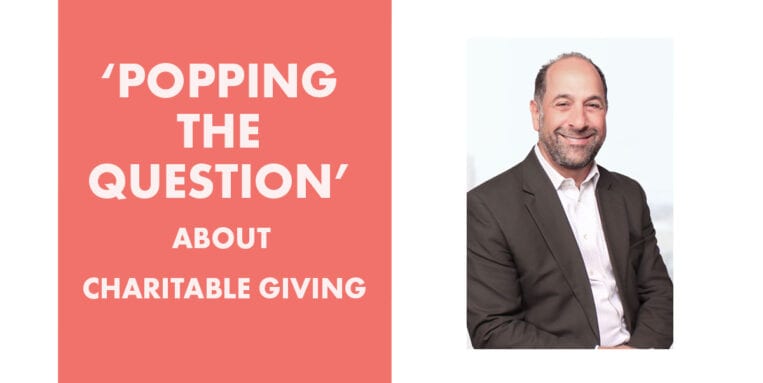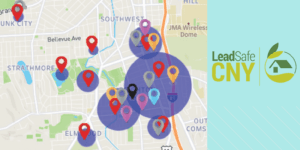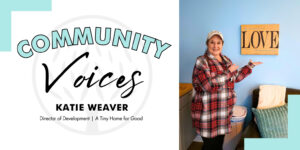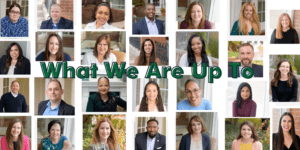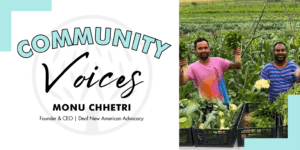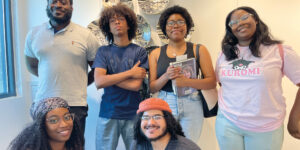A U.S. Trust study found that people want their financial advisors to ask them about charitable giving. In fact, a third of clients surveyed think the topic of charitable giving should be raised in the very first meeting. Yet fewer than half feel their advisors are good at discussing personal or charitable goals with them.
Wondering how to start a conversation about charitable giving with your clients? Or looking to refresh your approach? As part of an ongoing series, we’re asking some of Central New York’s most experienced professional advisors how they ‘pop the question’ about charitable giving to their clients.
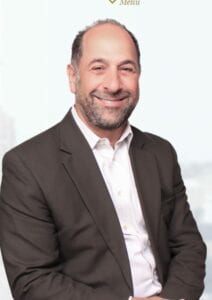 Hear from David Ayoub, Partner-in-Charge: Tax Department, Bowers & Company CPAs, PLLC, on how he ‘pops the question.’
Hear from David Ayoub, Partner-in-Charge: Tax Department, Bowers & Company CPAs, PLLC, on how he ‘pops the question.’
Why do you think it is important to bring up the topic of charitable giving?
I bring up the topic of charitable giving for a couple of reasons. I look at it from a tax planning standpoint. I bring it up as a part of the planning for the clients who are inclined to be charitable to help reduce their tax burden as well as meet their philanthropic goals.
Every client is different and we usually see three different types of clients: 1) Some clients are very philanthropic and see charitable giving as something they need to do. It makes them feel good and yes, they get a tax deduction. They are concerned about giving and they are very specific about what nonprofit organizations they want to give to. They want to leave a legacy and just need help identifying what planned giving vehicle they should use based on their situation. 2) Some clients are more tax driven. During their planning, I explain a myriad of ways to give and to receive tax benefit based on what they use for charitable giving such as cash, stock, real estate, etc., and 3) Some clients are just not interested in charitable giving. I have to respect that and help clients accordingly from an objective perspective as their tax advisor.
How do you learn about your client’s charitable interests?
Well, my clients’ charitable interests change over time as a course of going through different life stages. With a brand new client, this is part of the questions that I ask as I am reviewing their past tax returns and see that they had given to a charity in the past. If they were charitable, I simply ask them whom they are giving to and why. However, charitable interests evolve over time for our clients and our clients are people we know, we care about and we do work for annually. We develop a good relationship over time and we just know what they like and what they don’t like; it’s a part of relationship building and relationship management.
At what point(s) in your process do you bring up/revisit the topic of charitable giving?
I certainly discuss the topic of charitable giving in the annual review process because like I said, it’s a tax deduction. I am their tax planner, so the topic of charitable giving comes up annually. I will answer questions during the year when clients are looking for more than just a tax deduction. They may have something specific they want to take care of or they may have reached a point in their financial status that they feel like they can take care of a charitable issue. They ask me what the best way to go about it is and I advise them accordingly.
What questions or ideas about charitable giving do you find resonate the most with your clients?
Some clients are very successful business people. For example, one successful business owner gave a few thousand dollars to a religious institution over the years and a few other charities, but nothing of any substance. The client had a business event that was rather significant and that’s when the issue of charitable contribution became very important to her. When I started talking to this client about using her appreciated stock for charitable giving, she was surprised that she could do that. I can’t always advise my clients to give more than they do, but when a significant event occurs that my clients need to use a planned giving vehicle, it resonates more with them at that particular time.
How has your approach changed over the years?
My approach for bringing up the topic of charitable giving has definitely evolved over the years based on my personal charitable giving experience and changes in the tax laws. We have to keep up with those changes in the tax laws to be able to advise our clients. For example, the Tax Cuts and Jobs Act of 2017 led us to advise a lot of our clients to create donor-advised funds.
Also, I use my personal experience in charitable giving to offer advice to my clients who are charitable inclined. Many of my business partners, and I have donor-advised funds at the Community Foundation which makes us comfortable suggesting them to our charitable clients who can benefit from them. Our clients trust us and say, “Why wouldn’t we go this route when our advisors are utilizing them too?” In fact, I really believe we have spurred on some additional donor-advised funds because of the positive experience we have had with them. It makes our job easier since the Community Foundation is a great resource for advisors like us. When my clients ask me, “How do I set up the fund?” All I have to do is connect them to a staff at the Community Foundation and everything is taken care of. The only challenge of having a donor-advised fund is remembering my password for the online donor portal when I make grants.
Additional Comments:
We like to help our clients with their charitable giving by 1) providing technical expertise on different planned giving vehicles and offering options that makes sense technically from a tax standpoint and 2) being able to put them in touch with the Community Foundation directly. Having that connection with the Community Foundation is a great resource for us to help our clients accomplish their goals in the charitable space.
